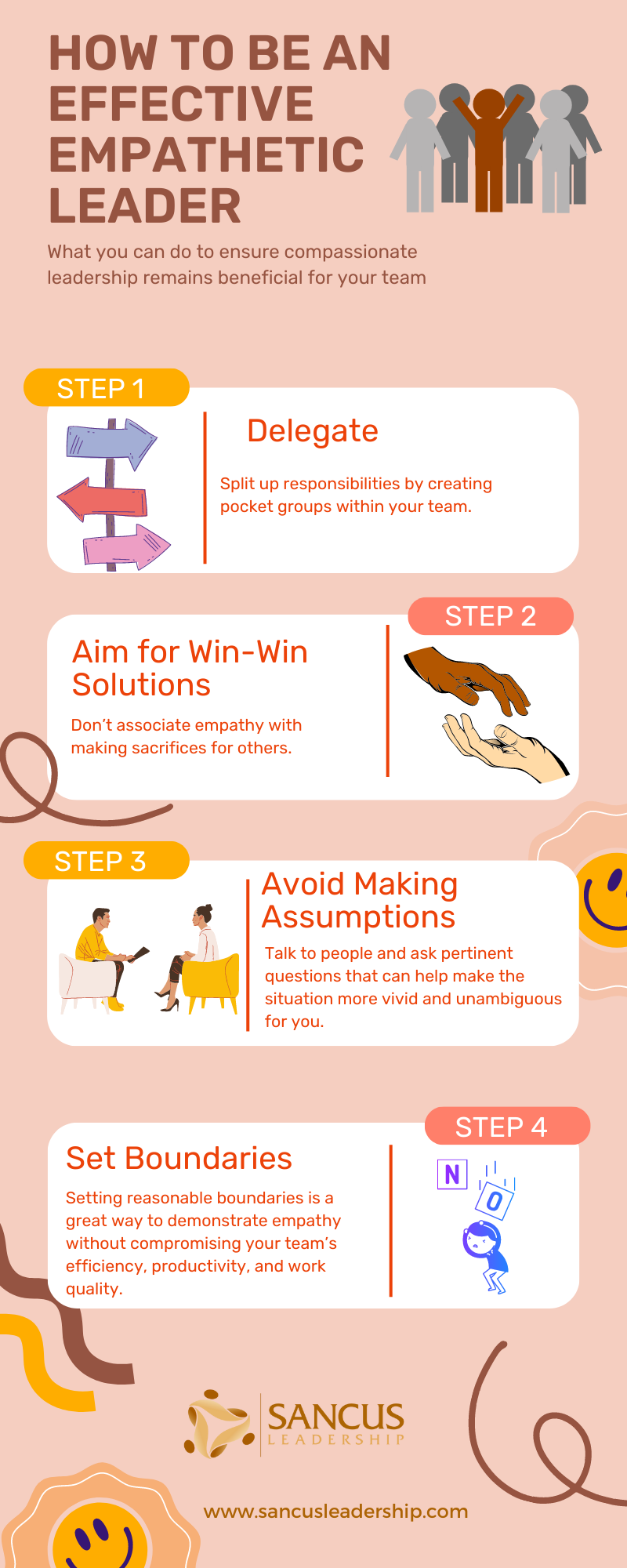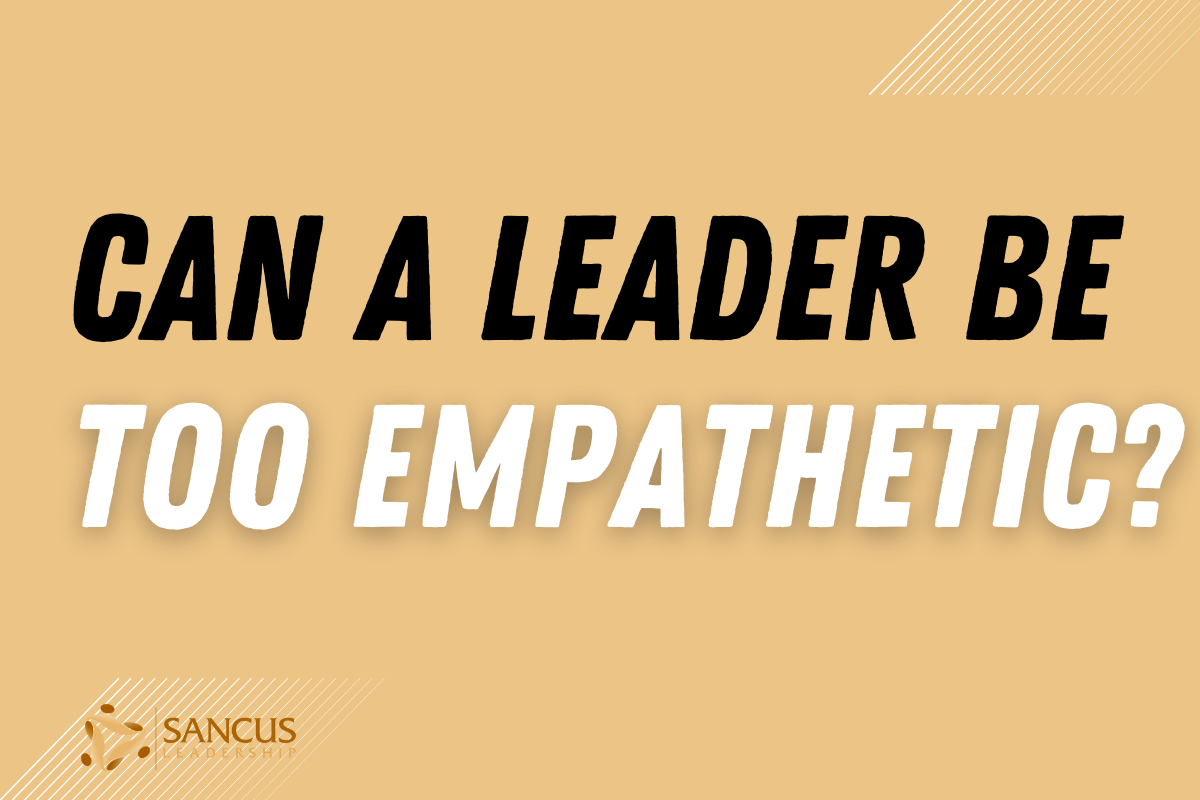Are you constantly asking yourself, “How would I feel if this happened to me?” If so, compliments to you because this may be a sign that you’re an empathetic leader — a genuinely admirable leadership quality. Even so, consider taking this as a warning that you might also be taking empathy too far — unbridled compassion can cost you your team’s respect. It may adversely affect the business’ productivity.
Leaders can be too empathetic, especially when genuinely wanting to help others. Clear signs of toxic empathy include values and ethics being compromised and personal time and needs being sacrificed. Too much sympathy can lead to anxiety, burnout, poor accountability, and low productivity.
Stick around to find out what toxic empathy is all about and how it can harm your team’s dynamics, the business’ productivity, and your mental health. We will also talk about the benefits of finding the right level of empathy and what steps you can take to get there. Let’s begin!
Can a Leader Be Too Empathetic?

Empathy is the ability to understand and share the feelings of other people. It is regarded as a critical leadership value that promotes engagement, commitment, and collaboration in a team. When a leader is empathetic, they acknowledge and try to understand the other person’s point of view, whether they agree with them or not.
Empathy is the ability to understand and share the feelings of other people. It is regarded as a critical leadership value that promotes engagement, commitment, and collaboration in a team.
The lack of empathy in a leader gives rise to many unfavorable scenarios that the team has practically no choice but to weather. These may include:
- Narcissistic behavior
- Inadequate openness and transparency within the team
- Cruelty and injustice
- Heightened tendency to shame, ridicule, or embarrass team members
Many leaders think that fully empathizing with their employees will earn them their team’s respect, trust, and loyalty. In reality, too much empathy is not good either. Much of it involves jeopardizing your authority, influence, and power as a leader, and this is not worth taking a risk on.
A leader can be too empathetic in the eagerness to establish solid relationships within the team. If you’re constantly sacrificing your own needs for those of others, you might be demonstrating excessive empathy. This is a precarious predicament since it can evoke resentment for you and affect the job performance of your team.
What Happens with Too Much Empathy?
Although empathy is critical in effectively leading and managing a team, too much of it can have disastrous effects on your employees, the organization, and even you. This is where toxic empathy enters the scene.
There are different types of empathy:
| Types of empathy | Description |
| Cognitive empathy | You can imagine what it would be like in the other person’s shoes and relate to their perspectives without necessarily feeling the same emotions they do. |
| Emotional empathy | You can share other people’s feelings and emotions deeply. |
| Affective empathy | You’re often profoundly affected by other people’s emotions and perspectives. |
| Somatic empathy | You react physically to other people’s shared perspectives, often mimicking their actions and behavior. |
Toxic empathy is a predicament where you constantly strive to genuinely relate to other people’s situations and perspectives on all levels, so much so that you sacrifice your own needs and well-being for the sake of others.
Toxic empathy is a predicament where you constantly strive to genuinely relate to other people’s situations and perspectives on all levels, so much so that you sacrifice your own needs and well-being for the sake of others.
Here are some things that can happen when you demonstrate toxic empathy in your leadership style:
Effects on you as the leader:
- Anxiety
- Stress
- Burnout
- Notions of trauma
- Feeling drained and fatigued
- Compromised ethics
- Sacrificed personal and family time
- Loss of the team’s respect
Effects on your team:
- Reduced motivation levels
- Low engagement
- Increased absenteeism
- Lack of accountability
- Reduced productivity
What Is an Example of Toxic Empathy?

It may be challenging to differentiate practical empathy from toxic empathy and determine where to draw the line as a leader. So here are some examples of poisonous compassion to help you determine whether or not you’re becoming too empathetic with your team:
- You’re too invested in your employees’ problems and concerns that you often feel a strong need to solve their issues for them.
- Hearing a sad story from an employee affects your mood throughout the day, and you often imagine scenarios that make the tragic situation even more poignant.
- When employees fail at a task or make mistakes, you choose not to hold them accountable for their blunders, making up excuses for why they behaved a particular way.
- You expect and convince others to feel the same way you do and become more invested in other people’s concerns.
- Your needs, concerns, and responsibilities take a back seat just so you can cater to your employees’ issues (for instance, you skip lunch to covertly edit an employee’s work to make it look more impressive than it is).
Why Empathy is Essential in a Team

Practical empathy is a vital element of successful leadership which allows a leader to meet the emotional needs of employees while promoting teamwork, high engagement, efficiency, and productivity.
Practical empathy is a vital element of successful leadership which allows a leader to meet the emotional needs of employees while promoting teamwork, high engagement, efficiency, and productivity.
Here are some other benefits of adopting empathetic leadership:
- Encourages teamwork
- Enhances commitment
- Promotes faster conflict resolution
- Develops strong bonds within the team
- Promotes efficiency in resolving conflicts
- Helps generate collaborative strategies and equitable solutions
How To Be an Effective Empathetic Leader

Embracing empathetic leadership means you must strike a good balance between empathy and professionalism. You must be there for your team members and walk in their shoes when needed. Still, upholding critical aspects of the team’s dynamics, such as accountability, transparency, and respecting boundaries, would be best.
When you’re ready to discuss striking that perfect balance between empathy and professionalism, don’t hesitate to book a call! We at Sancus Leadership can help you become the practical, empathetic leader you’ve always wanted to be.
But first, let’s talk about what you can do to ensure compassionate leadership remains beneficial for your team:

1. Delegate
Rather than directly engaging with everyone, developing relationships with them, and empathizing with practically every employee, split up responsibilities by creating pocket groups within your team.
One group can take charge of customer services, another can handle employee concerns, and another can oversee internal quality control. This way, the burden of developing relationships, gathering perspectives, and “care” obligations are distributed, and you don’t risk developing toxic empathy.
2. Aim for Win-Win Solutions
Don’t associate empathy with making sacrifices for others. Too much compassion will leave you feeling drained and exhausted and will put you at risk of losing your team’s respect.
A friend shared a story about a colleague who was a crowd favorite in the office. He was a popular and well-liked leader, with many employees wanting to work with him on his team. Management attributed it to his amiability, as well as his efficiency, professionalism, and aptitude for managing people.
One day, everyone was surprised when this colleague exploded at a team meeting — he slammed his fists on the table, shouted expletives, and stormed out of the room, leaving everyone with their jaws on the floor.
When asked what happened, his team said he got upset when a team member failed to deliver a report on time, saying she had a sleepless night with her newborn baby. Their leader usually didn’t mind stepping in for them when they had “valid” excuses, so this sudden behavior change caught them off guard.
My friend’s colleague was feeling drained, utterly burned out with work, and experiencing “compassion fatigue.” His mental resources and sympathy were depleted, all because he had been demonstrating too much empathy throughout his leadership career.
You can share a finite amount of empathy with your team as a leader. Make sure to maintain your reserves by always aiming for win-win situations when faced with difficult circumstances.
In the above example, it would have been more sensible for the leader to compromise with his team rather than stepping in and doing their work for them when they can’t. He probably wouldn’t have felt used and abused if he had insisted on making them feel more accountable for their lapses.
3. Avoid Making Assumptions
It’s easy and tempting to sensationalize situations in our minds, making them seem sadder, more complicated, or more dire than they are. Rather than succumbing to this intriguing habit, talk to people and ask pertinent questions that can help make the situation more vivid and unambiguous for you.
This is a more brilliant, more constructive, and less taxing way of empathizing with people. It focuses on gathering facts and information rather than speculating and imagining what it would be like in their shoes.
4. Set Boundaries (and Stick To Them)
Setting reasonable boundaries is a great way to demonstrate empathy without compromising your team’s efficiency, productivity, and work quality. Here are some tips on how you can carry this through:
- Never assume the role of a therapist or psychiatrist with upset employees.
- Mutually commit to equitable action plans when coming up with solutions to dilemmas.
- When you agree to make compromises, enforce the conditions attached to them.
- Ensure that you always have the final say (remember, you occupy the position of authority in the team) when conflicts arise.
- Ensure your employees know and understand corporate policies and their specific roles in the team — fostering a strong sense of ownership in their work ensures business continuity despite challenges and obstacles.
In this video, Simon Sinek explains why leaders must practice genuine and sincere empathy.
Final Thoughts
Many leaders have crossed the line between practical and toxic empathy because they genuinely want to help others. Remember that a poisonous heart can harm the business and even you.
What happens when you have too much empathy as a leader? You can experience burnout, anxiety, and high-stress levels. You may also sacrifice your own needs and personal time.
The key is ensuring you enforce the right level of empathy by promoting transparency and accountability, setting boundaries, and providing you never compromise your ethical standards.



